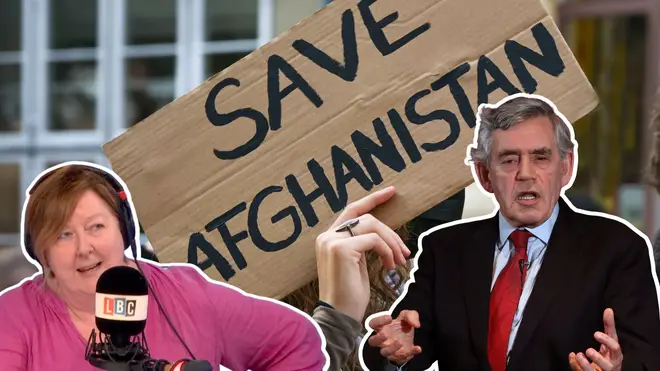
Clive Bull 1am - 4am
11 August 2023, 16:51 | Updated: 12 August 2023, 06:15

As the two-year anniversary of the Taliban's takeover of Afghanistan approaches on August 15, former Prime Minister Gordon Brown said the international community has not done enough in response to their "crimes against humanity".
Gordon Brown, who serves as the UN special envoy for global education, explained to Shelagh Fogarty why the International Criminal Court should challenge them.
He said: "I've visited Afghanistan over many years and I saw girls getting to school in the 20 years after 2001, and now we are seeing the most egregious, the most vicious, the most heinous abuse of human rights affecting girls and women in any part of the world."
He continued: "It is comprehensively, systematically depriving girls and women of the right to education, the right to employment the right to walk in public places, the right to wear particular garments.
"The whole exercise by the Taliban is what is called by many people now, gender discrimination and you could call it gender apartheid, and it's a crime against humanity."
The former Labour leader said the Taliban should be challenged by the ICC, saying: "Any crime against humanity should be prosecuted.
"They should investigate it, they should prepare a report and then take action against those members of the regime, and possibly the religious clerics behind it who are trying to suggest that it's against Islam to give girls education when of course in every other Islamic country, girls are being educated and going to school."
He expressed his disappointment with the international response, saying: "The governments of the world have done far too little. Everybody has condemned this, everybody has said it's a violation of human rights, but too little has been done to force the Taliban into a change of policy."

Shelagh Fogarty reacts to Gordon Brown's call for the Taliban to face charges
Gordon Brown noted a split within the Taliban, explaining that the "religious clerics in Kandahar are trying to dictate to the Ministry of Education in Kabul".
"I do think there is a chance of us making progress by exploiting the fact that there is not a consensus now in Afghanistan that this is the right thing to do", he said.
He called on "Muslim-majority countries who can have real influence over the Afghan government to send a delegation to meet both the government and the religious clerics and say 'look this is an unacceptable interpretation of Islam'".
"I think sanctions should be imposed by the UK government on all these leaders of the Taliban who've enforced this policy, and that has happened within the European Union but not in America or Britain", he added, reiterating that "the Taliban need to know that there is nothing in Islam that justifies this behaviour".
The UN special envoy also connected this with girls being trafficked and forced into early marriages, because they are not registered at school and it is therefore harder for authorities to keep track of them, noting there are "thousands of girls" who are unaccounted for.
"This is a totalitarian, authoritarian regime that has decided to discriminate against half the population. They're betraying the future of girls, but they're also betraying the future of the country", he said.
"While repression can succeed for a short time, it cannot succeed forever", Mr Brown added, emphasising that "we must not allow this second anniversary of the takeover by the Taliban to pass without saying that this abuse of girl's rights and women's rights is something that no civilized society can ever defend".
He also implored people who are apathetic to the issue to listen to the stories of Afghan girls who "are alive but not living".